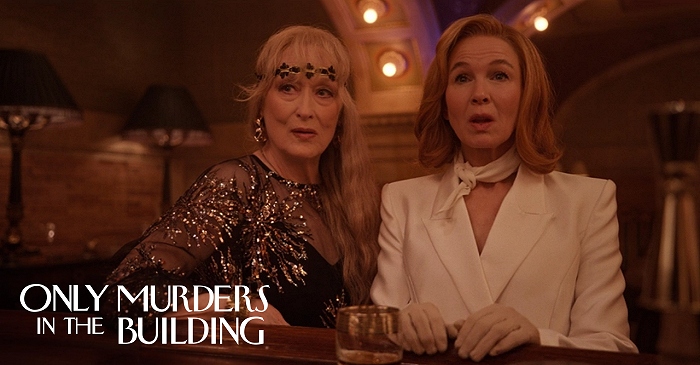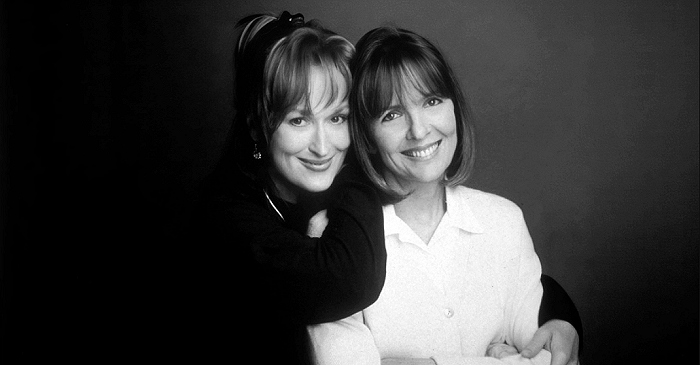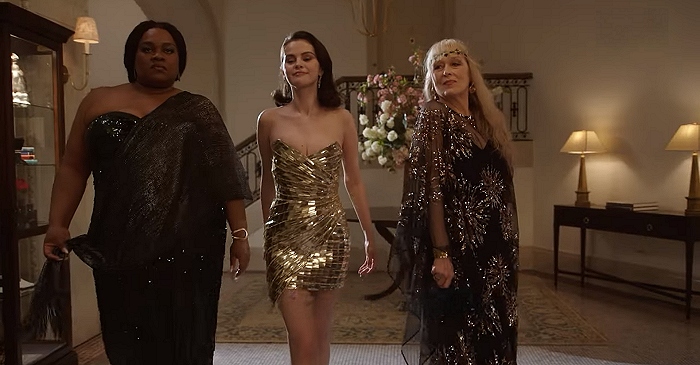|
Simply Streep is your premiere online resource on Meryl Streep's work on film, television and in the theatre - a career that has won her acclaim to be one of the world's greatest living actresses. Created in 1999, Simply Streep has built an extensive collection over the past 25 years to discover Miss Streep's body of work through thousands of photographs, articles and video clips. Enjoy your stay and check back soon.
|
|
Queen of the Cinema juggles the royal rush
The Chicago Tribune ·
December 21, 1982
· Written by Gene Siskel
| ||
The slight, demure, 33-year-old actress, dressed in a simple skirt and blouse, nods her eyes more than her head – she has been through this before – when asked about the difficulty of being “Queen Meryl of the Cinema” and if, indeed, her biggest problem with acting right now is dealing with the extraordinary praise – and, in some quarters, skepticism and even hostility – that now greets her almot every role. “It’s OK,” she said with a sigh, “because basically I think that the work will stand, no matter what. And even if a lot of people now have certain bones to pick with me because of all my publicity, all those things will be forgotten in a long time; and 10 years from now, the work will still be there. All that matters is that I’m enjoying it. I love what I’m doing”.
And then she told a fresh story: “I was at this party last night for Sophie’s Choice (her latest film, which opened nationally Dec. 10) and a publicist said to me, ‘Oh, there’s Arthur Bell, the columunist from the Village Voice.’ And my husband (sculptor Don Gummer) took my arm and walked me away across the room. I got upset with him becaue I was talking to someone and I said, ‘What are you doing to me?’ He said: ‘That guy wrote some terrible things about you, and you don’t know it, and I never told you. He’s got a bone to pick with you. He doesn’t like you for some reason. He talks about your skin and how you dress’.” “So,” Streep continued, “I still don’t know what he wrote, but just knowing that he wrote something hurts my feelings. But if I can keep far away from these things and not read every piece of junk that’s written about me, then I can successfully be not self-conscious all the time. If I’m self-conscious all the time, I can’t do what I do.”
“I’ve got plenty of people gunning for me,” she said with another sight and with her typical candor, “but as long as I can keep working, it really doesn’t matter. When what they say affects who hires me, then I won’t get mad, I’ll get even. I’ll personally go to (Bell’s) house and break his – legs. For now, though, it’s OK”.
Actually, it’s more than OK with Meryl Streep. Once again she is earning ecstatic reviews for what amounts to another double role (following The French Lieutenant’s Woman) – in Sophie’s Choice, William Styron’s best-selling novel about a young writer from the South who ventures to New York in 1947 and learns about love and death from a mysterious Polish concentration camp victim and her rapacious American lover. Streep plays Sophie Zawistowska in both the film’s horrifying concentration camp scenes, for which she had to lose a lot of weight and learn to speak Polish, and in the New York scenes, for which she had to gain weight and master the tricky broken English of a refugee. “The only thing that was tough about the part was saying goodbye to it,” she said, again displaying her honesty. “I could have played it forever. It was wonderful, the best thing I’ve ever experienced. I told my husband that we are lucky human beings when we know where we are, when we are there. And I knew right in the beginning. I knew that I loved it and that it was working. It was sort of a precarious thing because I knew that it was going to be taken away from me, so it was always just a question of getting everything I could out of it. I loved every second. Nothing was hard. Getting the cases right in Polish was difficult. I could understand Polish, but I couldn’t speak it well. (The concentration camp scenes, filmed in Yugoslavia, are all played in Polish with English subtitles, a device that adds credibility to the scenes and to Streep’s linguistic performance.)
“It’s a tough language,” she said, “because you have to parse the sentences as you speak it because the objects and the modifiers all change their endings depending on where they are in the sentence. I was good in languages, French and Italian, in school, and I though, ‘Well, I’ll just pick this up right away.’ But it was tough.” Streep privately studied Polish and German for two months before filming.
The title Sophie’s Choice refers to decisions made in her stormy past and uncertain future, and Streep concedes that she herself doesn’t know if she would act in her own life in a manner similiar to fictional Sophie. “You can’t plan how you’re going to act in an emergency,” Streep said, speaking of the film’s shocking climax. “There is no speck of reasoning in that moment. And as an actress I can’t tell you why she does what she does. There is no logic to this point. But you know,” she continued, “there are so many choices throughout the film – whether she should live with that boy (the writer) or die with Nathan, whether to kill herself in church or live with guilt of refugees. But what is great about her is that she does make a choice, but then, if she has made the wrong one, she doesn’t quit; she goes on ’til the next thing hits her. What attracted me to the part? Has there been a character that interesting in the movies in a long time? I can’t think of one. Also, I did love that she had some humor, that she was funny. I hadn’t been able to play that before in my films.”
More of the Streep humor – and despite her ice queen looks she can be very, very funny in person – will be on view in her next film, Silkwood, due for release in August or September. Production is finished. Streep plays Karen Silkwood, the nuclear fuel worker, whose unsolved death in 1974, an apparent murder, has been linked to attempts to silence her outspoken rage at the dangers of nuclear energy. “It’s the kind of character I haven’t done before, someone who is close to being me. She’s a smalltown Texas girl who has been displaced to an Oklahoma factory to produce fuel rods for a nuclear plant. She is a lot like me, my real perfonal self. She has a lot of humor, is a little sassy, gets a lot of people mad at her and she does what she believes she has to do. I think her sense of humor is going to come as a surprise. She’s pretty funny and I liked that about her. I don’t know if she herself was that way, but her boyfriend in real like, who I talked to quite a bit, told be that she really liked to laugh.”
Silkwood was directed by Mike Nichols and co-stars Cher as Karen’s girlfriend and Kurt Russell as her boyfriend. Streep laughed when asked if she was worried that audiences might think that Silkwood will be the same kind of anti-nuclear film as The China Syndrome. “That’s like thinking that ‘New York, New York’ is just like ‘Manhattan’ because it’s the same island,” she popped. “The film does deal with the issues of the sloppy production of nuclear fuels and the problem of disposition of their wastes. But it really is more of a character study of these three people, set in 1974, It’s very much about that time. It’s about people waking up.”
Next on tap for Streep may be some well-deserved time off; her doctor has informed her recently she is pregnant with her second child. “Mike Nichols and I are working on getting rights on a play. That’s next. But maybe sometime off would be good, too. You know, after Kramer came out I didn’t work for a year, and people said I was stupid because I was at the top of my career and I was missing all these great opportunities.” Though Streep says that politics are not a concern in her films and that she is “not pursuing any line,” Sophie’s Choice represents the second time in the young actress’ career that she has performaed in a story about concentration camps; she also appeared in the widely seen television mini-series Holocaust. A recent article in the New York Times pointed out that there has been a significant number of Holocaust films, plays, books and TV shows of late, and some critics argued that the horrible reality of Nazi Germany can only be trivialized by art, not to mention by commerce. “I do worry about that happening, and it has happened”, Streep said, “but I don’t think I’ve contributed to it. And I do think it’s true that people are never going to be really moved by a big statistic and that you have to try to reach them with the horror through the heart.”
Sophie’s Choice is not the only film that Streep has out this holiday season. In Still of the Night, a Hitchcock-like suspense thriller, Streep plays a mysterious, silver-haired seductress who lures psychiatrist Roy Scheider into following her throughout New York and into the fantasies of his own mind. The film’s main guessing game is whether of not Streep is the film’s knife-wielding killer. Still of the Night opened last month in New York to mostly negative reviews both for the film and, to a lesser extent, for Streep herself. Informed that her interviewer didn’t like the movie either and had a “Who the hell cares?” reaction to its story, Streep quietly reached out and – again, with surprising candor – shook hands in agreement. “Me, too,” she said after a bubbling laugh. “That was my reaction, too. You know what they say about silk purses and sow’s ears. It is what it is. I’m not ashamed of what I did, but I wish we’d all aimed higher. People who are smart can’t just do something that they think will be popular because that’s what’s selling now. My flaw is that I did it because I love Benton (writer-director Robert Benton, who directed Streep in her Academy Award-winning role in Kramer vs. Kramer) and I wanted to work with him again. It was shot in New York. I rolled out of bed to go to work. I was with my baby (Henry, now 3) more than I had ever been. I didn’t have to work every day.”
So she made a pact more with friendship and convenience than with art? “Yes,” said the woman who apparently does not lie, “but at the same time, I don’t feel it’s all that bad. I really don’t. And, you know, actors are actors”. Meaning what? “That you keep working. Take a look at what else whas being made at that time. What else was there to do? I made that picture a year ago. I can’t believe they’re only releasing it now. They’re trying to take advantage of all the interest in Sophie’s Choice, which they knew was going to get good reviews. But you know what? Still of the Night will disappear. I have certain confidence in people, that what is good – Sophie’s Choice – will shine and what isn’t will go away.”













